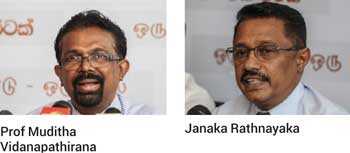Tuesday Feb 17, 2026
Tuesday Feb 17, 2026
Saturday, 8 June 2019 00:05 - - {{hitsCtrl.values.hits}}
 By Ruwandi Gamage
By Ruwandi Gamage
With the hopes of bringing the public together to press for change, a few businessmen have brought forward a people’s mandate, requesting all patriotic citizens of Sri Lanka to participate in signing it to press the Government for more transparency and accountability.
The mandate, carrying six propositions, is aimed at compelling politicians to take notice of the changes people are pushing for, and to indirectly make use of it as a referendum. The mandate proposes one common legal system without discrimination for race, religion, and ethics of referrals; banning of political parties which discriminate based on race, ethnicity, or religion in their name and principles; developing and implementing policies that prioritise national security; implementation of a code of ethics for politicians to be treated as equal citizens; upholding freedom and rights alongside preservation of nature and all cultural heritage; and to legislate against extremism and terrorism in Sri Lanka.
Trillium Property Management and Services Ltd. Chairman Janaka Ratnayake, Chartered Accountant Sujeewa Rajapakse, University of Jayawardenapura Professor of Forensic Medicine Muditha Vidanapathirana, Sydney Gajanayake and Gamini Karunathilake were the five individuals behind the mandate. The group is hoping to collect at least 6 million signatures through the support of citizens.
They are hoping to gather support from student groups, trade unions, organisations, corporations, and universities, in hopes of spreading the word and getting the support of the public to make the mandate a success. The mandate will be shared through digital, print, and social media, and the public can get back to the group with collected signatures through social media or post. All details are provided in the mandate.
“In the wake of the Easter Sunday attacks, we are doubtful of the country’s future and the future of generations to come. We need to make a difference and only talking about it won’t work, we need action. We are only administering this mandate, we are taking a bottom-to-top approach and are requesting the public’s support. If people do support this in significant numbers, politicians will not be able to dismiss or disregard the voice of the people, and will be forced to include these propositions in their political mandates,” Janaka Ratnayake added, making the opening remarks for the media.
Stating this initiative has no political gain, and is only to ensure a country that drives toward change and development, Sujeewa Ratnayake explained how the public needs to voice their opinion, and said the politicians need to be treated similar to common citizens, not celebrities.
“We need to change the attitudes, mind-set, and discipline of politicians to understand that they are temporary leaders, and do not own the country. By establishing a code of conduct, we can change the mindset of politicians that they aren’t VIPs. It is possible to bring about change and development like in India, China, and Singapore. Sri Lanka is in a good location, we need to take use of that,” Ratnayake said.
Adding to the conversation, Prof. Vidanapathirana asserted that laws, legal systems and policies that discriminate against race, religion, and language have to be a thing in the past, and common laws need to be put in place for all citizens. Sydney Gajanayake added that as a group of individuals in their 50s and 60s, they have witnessed the country go through unrest and difficulties from the 1970s until now, and said they want a better country for the generations to come. Gamini Karunathilake also explained how the two goals that would be achieved through this mandate would be awareness of the need for change and the need for change in attitudes of the general public.